MLB All-Decade Team: 1990-1999

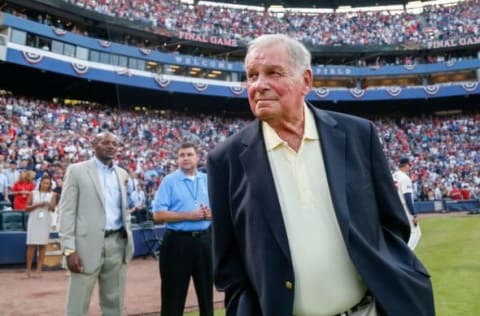
If you were a baseball fan in the 1990s, you saw countless great players, powerhouse teams, exciting events… and more than a few home runs. Which players would have a spot on an MLB all-time team from that decade?
The 1990s were an amazing time to be a baseball fan. They had everything from a strike in 1994, to record-breaking, steroid-induced home run chases between some of the best sluggers of our generation, Cal Ripken Jr. immortalized as an the “Iron Man”, Ken Griffey Jr. putting the prettiest left-handed swing we have ever seen on display, the Braves almost-dynasty, the Yankees actual dynasty and so much more.
With all of the star power and future members of the Hall of Fame, what would a 90s all-decade team look like? Wonder no more, as we have put together a position-by-position list of the best 90s superstars, including a manager, for your viewing pleasure and believe us, it’s all that and a bag of chips.
Manager: Bobby Cox – Braves
Bobby Cox did it all for the Braves in the 90s including build the early core of talent while he was the team’s general manager in the late 1980s. As a general manager, Cox was responsible for acquiring talent like Tom Glavine, David Justice, Steve Avery and Pete Smith. Cox also drafted Chipper Jones with the first overall pick in the 1990 MLB Draft.
Cox appointed himself manager in June of 1990, and by the end of the 1991 season the Braves were on their way to a World Series appearance, becoming the first team along with their eventual World Series opponent the Minnesota Twins to go from a last place finish the season prior to a first place finish. While the Braves would lose the 1991 World Series to the Kirby Puckett led Twins, the Braves would go on to win the 1995 World Series.
Although they only managed to win the lone World Series championship in 1995, the Bobby Cox led Atlanta Braves would win five National League pennants between 1990-1999. Cox would go on to manage the Braves through the 2010 season and win a total of 2,504 games.
Catcher: Mike Piazza – Dodgers (1992-1998), Marlins (1998), Mets (1998-2007)
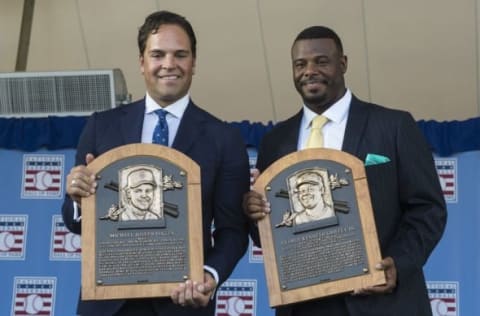
The newly inducted member of the National Baseball Hall of Fame Mike Piazza was an offensive force at a position where offense generally comes at a premium. From 1992-1999 Piazza would slug 240 home runs and drive in 768 runs. Keep in mind that Piazza only played 21 games in his rookie year of 1992, so the vast majority of those prolific numbers were posted during a stretch of only seven seasons.
Piazza would be named the National League Rookie of the Year in his first full season in 1993 and go on to garner seven All-Star selections, finishing in the top 10 in MVP voting six times during the same span, placing as high as second place twice.
Mike Piazza would finish his career up with 427 home runs and 1,335 RBI, complemented by a .308 career batting average. Piazza would receive a total of 12 All-Star Game selections. His 427 home runs rank 47th on the all-time home run list as of today.
First Base: Frank Thomas – White Sox
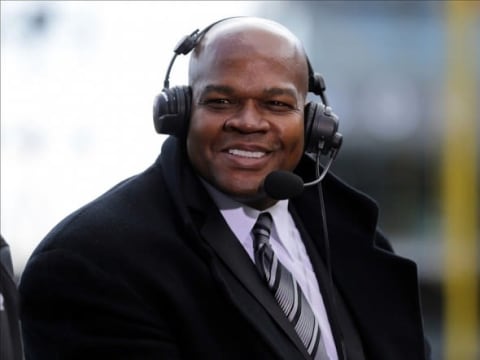
The Big Hurt was a physical specimen for his time standing at 6-foot-5 and weighing 240 pounds. Frank Thomas would make his debut for the Chicago White Sox in 1990 and eclipse the 300 home run mark by the end of the decade, finishing up the 1999 season with 301 career home runs and 1,040 RBI.
Thomas would win back-to-back American League Most Valuable Player Awards in 1993 and 1994, while earning five All-Star Game selections and winning three American League Silver Slugger Awards.
Frank Thomas would win a World Series championship with the Chicago White Sox in 2005 before heading to Oakland and Toronto from 2006-2008 before wrapping up his Hall of Fame career after the 2008 season, finishing with 521 home runs, 1,704 RBI and a career batting average of .301.
Many believe that Frank Thomas was the greatest slugger of the nineties, who was often overlooked in favor of players like Mark McGwire, Sammy Sosa, Alex Rodriguez and Barry Bonds, who were all later found guilty of using performance-enhancing drugs.
Second Base: Craig Biggio – Astros
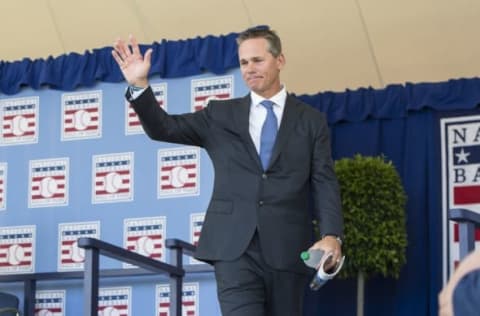
A dual threat at the second base position, Craig Biggio would be a staple in the Houston Astros organization from 1988-2007. From 1990-1999, Biggio would be selected to the National League All-Star team seven times, while winning four Gold Glove Awards and four Silver Slugger Awards over that same span.
During the 90s Biggio posted a .297 batting average to go along with 136 home runs, 641 RBI, 362 doubles, 35 triples and 319 stolen bases. Biggio would boast an on-base percentage of .382 over that span while accumulating 1,728 hits.
Biggio would end his career with 3,060 hits, good for 22nd in Major League Baseball history. Biggio’s .281 batting average, 291 home runs, 1,175 RBI, 668 doubles, 35 triples, and 414 stolen bases would propel him into the Hall of Fame in 2015.
Shortstop: Cal Ripken Jr. – Orioles
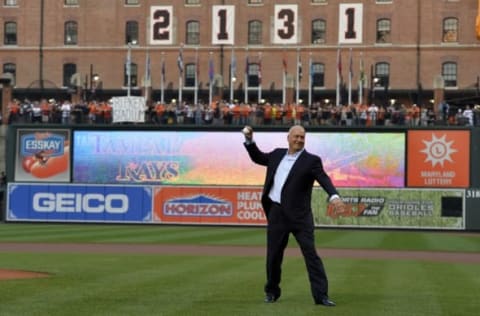
Cal Ripken would provide us with one of the greatest baseball moments of our generation on September 6, 1995, when he played in his 2,131st consecutive game, breaking a record held by Lou Gehrig for 56 years. The Iron Man wasn’t just good at showing up for every game, he was one of the best players in all of baseball during his career.
Ripken would accumulate 1,589 hits from 1990-1999, good for a .278 batting average over that span. Ripken also hit 198 home runs, 827 RBI, 305 doubles and 20 triples fueling him to an All-Star selection every season from 1990-1999. Ripken was named the American League Most Valuable Player in 1991. On July 15, 1993, Ripken surpassed Chicago Cubs legend Ernie Banks for the most home runs by a shortstop in major league history when he hit his 278th career home run.
Over the course of 21 seasons Cal Ripken would make 19 All-Star Game appearances, win two MVP awards, two Gold Glove Awards and eight Silver Slugger Awards while racking up 3,184 hits. Ripken would be inducted into the National Baseball Hall of Fame, have his number eight retired by the Baltimore Orioles and leave an unmatched legacy behind him.
Third Base: Chipper Jones – Braves
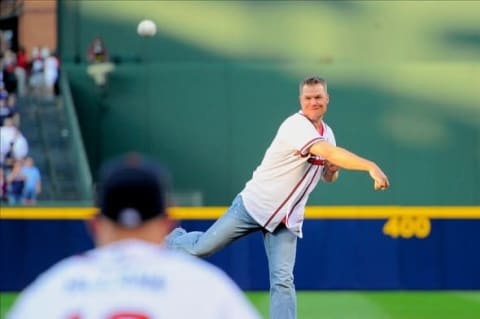
Chipper Jones was the cornerstone of the Atlanta Braves franchise for nearly two decades at third base, and as a result Jones holds the record for most playoff games as a third baseman. Jones debuted in September of 1993 but missed all of the 1994 season due to injury.
Jones would play his first full season in 1995 and help lead the Braves to their 1995 World Series championship. Jones hit 23 home runs while driving in 86 runs in 1995, finishing second in the National League Rookie of the Year voting and 18th in MVP voting.
Over his first five seasons in Major League Baseball from 1995-1999, Chipper Jones would post a .301 batting average with 153 home runs and 524 runs batted in. Jones would have an on-base rate of .394 for that time span, and be a part of multiple National League pennant-winning Braves teams.
In 1999 Jones posted a slash line of .319/.441/.633 while slugging 45 home runs and driving in 110 runs en route to winning the National League Most Valuable Player Award and the Silver Slugger Award. Chipper Jones would wrap up his Hall of Fame caliber career in 2012 with a lifetime .308 batting average complemented by 468 home runs and 1,623 RBI.
Outfield: Ken Griffey Jr. – Mariners
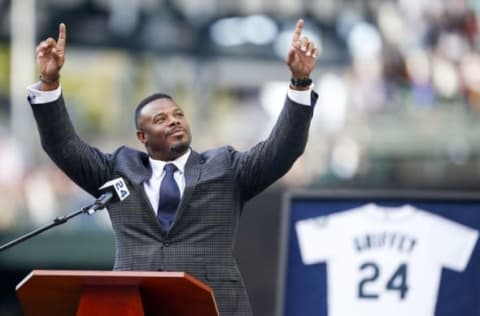
Without a doubt “The Kid” Ken Griffey Jr. was the greatest outfielder in baseball, if not the greatest position player in baseball during the 90s. Debuting in 1989 at the tender age of just 19, Griffey would rule the baseball from 1990-1999, with his backwards hat swagger coupled with one of the most gorgeous swings you will ever see.
From 1990-1999, Griffey would would hit .302 with 382 home runs, 1,091 RBI, 297 doubles, 30 triples and 151 stolen bases for the Seattle Mariners. Griffey would be selected the the American League All-Star team every single year during that span, while racking up the individual hardware along the way. In 1997 Griffey would be named the American League’s Most Valuable Player on the strength of a 56 home run season to go along with 147 RBI. Griffey would nearly duplicate those monster numbers again in 1998 when he clubbed 56 home runs and drove in 146 runs, but he came up short on his bid for back-to-back MVP awards, finishing fourth in the voting.
From 1990-1999 The Kid would accumulate 10 Gold Glove Awards, seven Silver Slugger Awards, 10 All-Star Game selections, and a league MVP award. Griffey would add only three more All-Star appearances during the next decade of his career with the Cincinnati Reds. Plagued by injuries, the superstar of the 90s wrapped his career up in 2010 back where he started in Seattle.
Griffey would end his career with a lifetime batting average of .284 to go along with 630 home runs, good for sixth on the all-time list. In 2016 Griffey was elected to the National Baseball Hall of Fame, accumulating a whopping 99.3 percent of the vote on his first ballot appearance.
Outfield: Barry Bonds – Pirates (1990-1992), Giants (1993-1999)
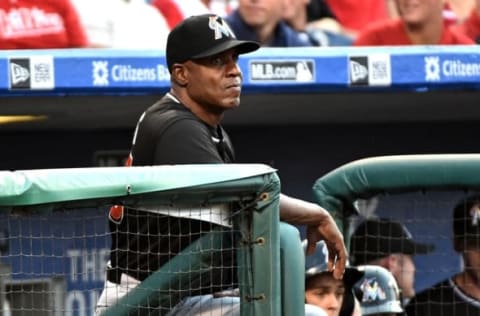
Barry Bonds was a perennial All-Star and possibly a future Hall of Fame caliber player long before he apparently turned to steroids in an attempt to keep up with the Mark McGwire’s of that era of baseball. From 1990-1999 Bonds would hit .302 with a .434 on-base percentage. He was a run-producing machine for the Pirates and Giants in the 90s, hitting 360 home runs, driving in 1,076 runs and scoring another 1,091 runs himself.
Bonds was more than just a prolific power hitter in the 90s, as he would accumulate 1,478 hits, 299 doubles, 42 triples and 343 stolen bases. Bonds was also a premier left fielder, winning eight Gold Glove Awards during that span, to go along with eight All-Star Game selections, seven Silver Slugger Awards and three National League Most Valuable Player Awards.
Bonds would finish his career up with an all-time high 762 home runs, 2,558 RBI and 688 intentional walks. As we all know, the latter part of Bonds’ career has been forever tainted by steroid usage. Bonds will likely never see the National Baseball Hall of Fame because of such events, which is a shame because he was on track to be a first ballot entry for the HOF before the steroids.
Outfield: Albert Belle – Indians (1990-1996), White Sox (1997-1998), Orioles (1999)
Albert Belle would only play 12 season in the major leagues, with 10 of the 12 being from 1990-1999. During that span Belle was a premier power hitter in baseball, racking up 351 home runs and 1,099 RBI for the Cleveland Indians, Chicago White Sox and Baltimore Orioles.
Belle posted a .299 batting average, 344 doubles and 16 triples over that same span, while being selected to represent the his team in the MLB All-Star Game five times. Belle also won five Silver Slugger Awards and finished within the top 10 in MVP voting five times over the course of those 10 seasons.
Belle’s greatest season came in 1995 when he led the American League in home runs (50), RBI (126), runs (121), doubles (52), slugging percentage (.690) and total bases (377). Belle posted a .317 batting average in 1995, falling short of baseball’s Triple Crown achievement by .39 percentage points to that year’s American League batting champion, Edgar Martinez.
Designated Hitter: Edgar Martinez – Mariners
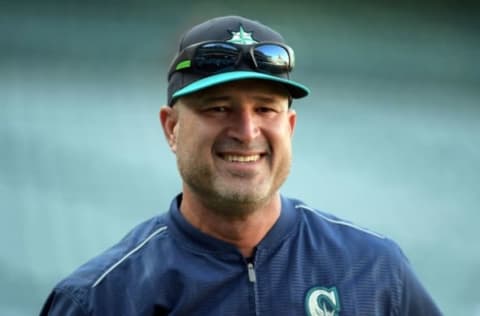
It wasn’t until the 1995 season that Edgar Martinez became the Seattle Mariners’ full-time designated hitter, but Martinez was an offensive force for the Mariners in the 90s. Martinez would post a .322 batting average from 1990-1999, with an even more impressive .430 on-base percentage.
Martinez mashed 196 home runs and drove in 750 runs for the Mariners during that span, and also accumulated 1,492 hits, 358 doubles, 15 triples and 854 runs scored. Martinez earned four American League All-Star selections, three Silver Slugger Awards and finished third in MVP voting in 1995.
Martinez would go on to win three additional Silver Slugger Awards, and be named to three more All-Star Game appearances before hanging it up following the 2004 season. Martinez has been on the National Baseball Hall of Fame ballot since 2010, never once accumulating more than 43.4 percent of the vote (2016), due largely in part to being a career designated hitter.
Starting Pitcher: Greg Maddux – Cubs (1990-1992), Braves (1993-1999)
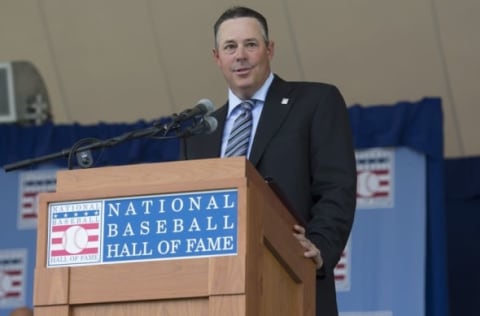
While it’s hard to dispute that anyone had more overwhelming stuff than the Big Unit Randy Johnson in the 90s, Greg Maddux was the best pitcher of the decade. Maddux posted a 176-88 W/L record from 1990-1999 with an incredible 2.54 ERA.
Maddux was nicknamed “The Professor” due to his ability to be one of the most dominant pitchers in baseball while lacking overwhelming velocity. Maddux would throw 200-plus innings every season and lead the league in innings pitched from 1991-1995. Maddux was awarded the National League Cy Young in 1992, 1993, 1994 and 1995.
Aside from winning his fourth consecutive Cy Young Award in 1995, Maddux led the Atlanta Braves to a World Series championship that season, finished third in the National League Most Valuable Player voting and won a Gold Glove Award. From 1990-1999 Maddux would win four Cy Young Awards, 10 Gold Glove Awards and six National League All-Star selections.
The Mad Dog would end his career in 2008 with a total of four Cy Young Awards, eight All-Star Game appearances and 18 Gold Glove Awards. Greg Maddux won 355 games over the course of 23 major league seasons and was inducted into the National Baseball Hall of Fame in 2014.
Relief Pitcher / Closer: John Wetteland – Dodgers (1990-1991), Expos (1992-1994), Yankees (1995-1996), Rangers (1997-1999)
Most people’s first thought would be Mariano Rivera, but Rivera didn’t enter the league until 1995, and even after making his debut he wasn’t the Yankees closer until the 1997 season, after the departure of John Wetteland.
Wetteland appeared in 525 games from 1990-1999, notching 295 saves during the process to go along with a 2.66 ERA. Splitting time with the Dodgers, Expos, Yankees and Rangers, Wetteland appeared in only three All-Star Games, while finishing up inside of the top 25 in Most Valuable Player voting four times, as well as placing sixth in the Cy Young Award voting in 1999 when he saved 43 games for the Texas Rangers.
Wetteland struck out 655 hitters over the course of 605 innings pitched during that decade. In 1993 Wetteland would save 43 games for the Montreal Expos, while posting a microscopic 1.37 ERA, striking out 118 hitters and walking only a mere 28 hitters over the course of 85 innings pitched.
More from Call to the Pen
- Philadelphia Phillies, ready for a stretch run, bomb St. Louis Cardinals
- Philadelphia Phillies: The 4 players on the franchise’s Mount Rushmore
- Boston Red Sox fans should be upset over Mookie Betts’ comment
- Analyzing the Boston Red Sox trade for Dave Henderson and Spike Owen
- 2023 MLB postseason likely to have a strange look without Yankees, Red Sox, Cardinals
Next: Best Closers of All Time
In 1996 John Wetteland was named the World Series MVP for the New York Yankees. Appearing in five games, Wetteland notched four saves while only allowing one run. Wetteland was also named the Rolaids Reliever of the Year during the 1996 season with the Yankees. His 330 career saves rank 14th in Major League Baseball history.